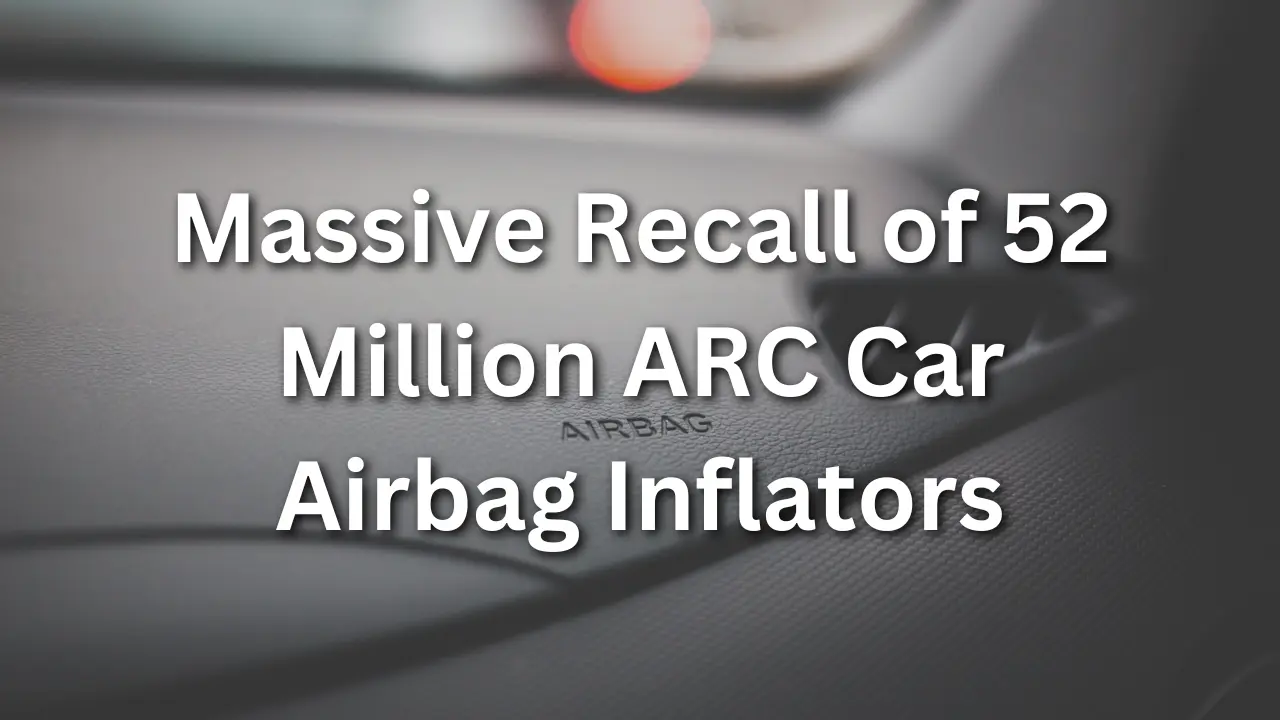Get ready for a potential massive recall of 52 million ARC car airbag inflators as the National Highway Traffic Safety Administration (NHTSA) is preparing to take action. The NHTSA has been investigating the issue since 2015 and has found at least nine ruptures and two deaths related to these inflators.
This recall could become the industry’s second-largest since the Takata recall, which affected 100 million inflators worldwide. The potential recall is a cause for concern, as it could result in a complicated and lengthy repair process for millions of vehicles.

Background Information About The ARC Car Airbag Inflators
The NHTSA is getting ready for a recall of up to 52 million ARC car airbag inflators. These safety items could be labeled as defective due to their risk of rupturing during deployment. The agency has been investigating the issue since 2015 and has found at least nine ruptures and two deaths caused by these inflators. ARC Automotive and Delphi Automotive Systems are the manufacturers involved, with ARC denying any manufacturing defects. In response to the issue, three automakers have already issued recalls.
Details of the Recall
The NHTSA recently held a public meeting to discuss the upcoming recall. The main concern is the potential for these inflators to explode and shoot shrapnel into the frontal occupants of the vehicle. The investigation into ARC inflators began in July 2015, shortly after the Takata airbag recall started unfolding. The repair process for these recalled airbags could take years, much like the previous Takata airbag recall. The estimated repair timeline and process will be discussed further.
Previous Recalls and Investigations
The Takata airbag recall serves as an important point of reference when discussing recalls related to airbag inflators. The ARC recall will be compared to previous recalls to provide a better understanding of the scale and impact. We will also discuss the progress and completion of previous recalls, as well as the number of fatalities and injuries associated with those recalls. This will help put the ARC recall into perspective.

What Are the Potential Dangers of the ARC Airbag Inflators?
The defects in the ARC airbag inflators are attributed to manufacturing problems. Excess weld slag can block the gas flow to the airbag, resulting in increased pressure and the potential for the inflator to rupture. When these inflators rupture, metal fragments are forcefully propelled into the passenger compartment, posing a significant risk to occupants. The NHTSA estimates that the risk of rupture during future crashes is approximately 1 in 370,000. Despite these findings, ARC Automotive denies any systemic defects in its inflators.
ARC Automotive’s Response
ARC Automotive, as a Tier 2 supplier, holds legal responsibility for initiating recalls. However, they dispute the NHTSA’s comparison of their inflators to Takata inflators, arguing that the root causes of the Takata failures were humidity and age, unlike their own products. They claim that the incidents involving their inflators are isolated and not indicative of a systemic defect. ARC also accuses the NHTSA of providing inaccurate and misleading information regarding their inflators.

Which Manufacturers Are Affected by the Recall?
A total of 12 manufacturers may be affected by the recall of vehicles equipped with ARC airbag inflators. These manufacturers include:
- BMW of North America
- Fiat Chrysler (FCA) US
- Ford Motor Company
- General Motors
- Hyundai Motor America
- Kia America
- Maserati North America
- Mercedes-Benz USA
- Porsche Cars North America
- Tesla
- Toyota Motor North America
- Volkswagen Group of America
The cooperation of these manufacturers is crucial in ensuring the success of the recall process.
Class-Action Lawsuits Against ARC
Six class-action lawsuits, alleging economic harm, have been filed against ARC, various automakers, and the two airbag manufacturers that used ARC inflators. These lawsuits have been combined under federal judicial review. One lawsuit in Northern California claims that ARC is at fault due to its use of ammonium nitrate, a propellant associated with the Takata failures. However, the NHTSA has not cited ammonium nitrate as a failure point or root cause in their investigations.
Did the NHTSA Make a Decision?
The NHTSA has not yet made a decision on whether or not it should issue a recall. However, the NHTSA is currently accepting written responses regarding the recall, and a final decision is expected to be released after December 4. This decision will define the course of action for the recall, including the specific steps and measures that need to be taken by the manufacturers and affected parties.
Consumer Action Law Group Can Help With Your Lemon Vehicle
If your vehicle is still under the original manufacturer’s warranty and is experiencing problems that persist after multiple repair attempts, it may be a lemon. This means that you may be entitled to some remedies such as a lemon buyback or a cash & keep settlement. If you believe that your car is a lemon, feel free to give us a call. On the call, we will be able to tell you if you have a potential lemon claim. The consultation is free, so there is no cost to you to find out if you have a case!












